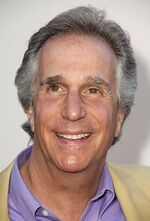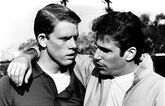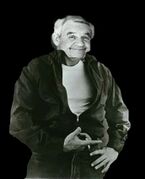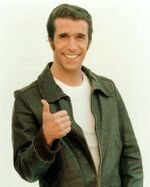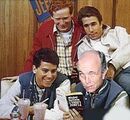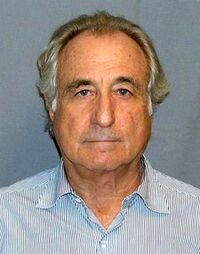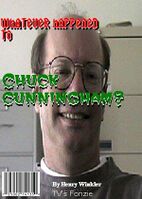Henry Winkler
“He stole my bit.”
“Aaaay!”
Henry Cletus Winkler (born October 30, 1945, in Pottersville, Tennessee) is a popular American actor, and world's second-oldest teenager, right behind Dick Clark and in front of The Rolling Stones and Eddie Munster. The son of actress Jean Simmons and English teacher Francis Winkler, he never dreamed that he would become an actor; he always dreamed of becoming a world-famous shark jumper like his idol, the late Eddie Edwards.
Although he has had many television, film, and theatrical roles, he is best known for his role as hipster greaser/mechanic Arthur Fonzarelli (a.k.a. Fonzy, Fonzie, and The Fonz) on the television sitcom, Happy Days from 1974 to 1984.
Career[edit]
Pre-Happy Days[edit]
Winkler was first bitten by the acting bug at age 15 when he saw the classic rebellion movie, Rebel Without Underpants, starring James Dean. Winkler idolized Dean and enrolled in several acting programs during his high school years. He nailed his first audition, landing the part of conservative patriarch Thaddeus F. Nottingworth on the Depression-era sitcom, Crappy Days. The show, which lasted for only one season in 1962, starred Winkler as Nottingworth, a 42-year-old suburban family man trying to survive during the Great Depression. Jean Simmons played wife Edna Nottingworth; children Harold, Wallace, and Edith were portrayed by Tony Dow, Ron Howard, and Shirley Temple, respectively; Tom Bosley played resident teenage hipster Tommy Fonzarello.
Viewers felt that 17-year-old Henry Winkler was far too young to believably play a 42-year-old father. Consequently, they also felt 35-year-old Tom Bosley was far too old to believably play a teenager. The already-low ratings dipped even further and the show was canceled in January 1963, allowing Ron Howard to return to The Andy Griffith Show as Opie Taylor. Winkler found success as a hipster in television commercials and as Ebenezer Scrooge in a Los Angeles production of A Christmas Carol.[1]
Ten years after the shows cancellation, a small but devoted group of followers known as "Crappies" bombarded ABC with requests to bring the show back from Cancellation Hell. ABC refused, and the Crappies set up an elaborate convention as a strange sort of revenge against the network. Most of the principal actors attended and signed autographs, and fellow Crappie George Lucas tried to pitch ABC a theatrical movie based on the sitcom, which the studio rejected on sight. Lucas decided to rework the film as a 1950s nostalgia-centric film entitled American Graffiti, which starred Ron Howard. After the film became a critical and commercial smash hit, ABC relented and brought back Crappy Days in 1974, albeit with a few adjustments.
Happy Days[edit]
Comedy creator Garry Marshall and ABC modified the show quite a bit for its 1974 makeover. First of all, the shows title was changed to Happy Days. Second, a few cast changes were made: Ron Howard reprised his role (now named Richie Cunningham); Shirley Temple, Tony Dow, and Jean Simmons were replaced by Erin Moran (as Joanie Cunningham), This Guy (as short-lived character Chuck Cunningham), and Marion Ross (as mother Marion Cunningham); Henry Winkler and Tom Bosley switched the roles of Thaddeus F. Nottingworth (now named Howard Cunningham) and Tommy Fonzarello (now named Arthur Fonzarelli). Since Fonzarelli's name was so hard to pronounce, Marshall insisted on calling the character by many names, including Fonzie, Fonzy, and The Fonz. The latter show was also broadcast in color, as opposed to the former's black-and-white format.
New characters were added: Ralph Malph (Donny Most), Potsie (Anson Williams), Chachi (Scott Baio) and Arnold (Arnold Schwarzenegger). The setting was changed from the Great Depression to the 1950s, taking cues from Lucas's film.
There was a controversy surrounding whether or not Fonzie should be allowed to wear a leather jacket, an issue that was never brought up during the production of Hrappy Days. ABC felt that the leather jacket would make The Fonz appear to be a criminal, a biker, and/or a juvenile delinquent. A controversial decision was made to make the character more conservative by removing the leather jacket and removing his "hip lingo" with proper American English, as spoken by a typical 1950s father. However, as the ratings declined in season 2, Arthur Fonzarelli was reverted back to his leather-jacket-wearing hipster self.
The ratings improved dramatically, but dropped to number 90,210 in the Nielsen Ratings when Ron Howard left after season 6 — thanks in large part to a particular episode, "Fonzie Jumps the Shark". Fans had already seen the writing on the wall, and they knew from then on that the end was near for Happy Days. Then Winkler actually jumped an actual shark and survived ... Anyway the show was brutally canceled in 1984.
Alfred "Big Al" Delvecchio was portrayed by Roger Ebert, whose frequent criticisms of the show and its episodes got him fired at the end of the first season. He was replaced by Luciano Pavarotti for the rest of the series.
|
Post-Happy Days[edit]
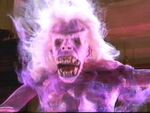
After Happy Days ended its decade-long run in 1984, Henry Winkler's roles were few and far between. His most successful role in the 1980s was as a ghost in the blockbuster comedy Ghostbusters. The role earned him a Best Supporting Actor nomination at the 1985 Academy Awards, which he lost to Don Ameche for his role in Cocoon.[2] In 1986 Fonzie took a break from acting to pursue his interest in the extreme sport of shark jumping. Unable to keep up with his insurance and bills, the 43-year-old quit shark jumping in 1988 and took odd jobs, including as the Indian in the The Village People. He was fired in March of 1989 for "not being gay enough".
In 1990 Winkler returned to acting when he auditioned for a planned sixth installment of the Halloween horror film series. He had been longing to co-star with Donald Pleasence, but was waiting for the right material. Unfortunately, Moustapha Akkad rejected the script immediately after Fonzarelli's audition. A new script would not be in the works until 1995, at which point Henry was unavailable. The movie, Halloween: The Curse of Michael Myers, was released in October 1995 with Paul Rudd in the role TV's Fonzie had auditioned for five years earlier, Tommy Doyle.
Recent and future roles[edit]
Upset about not getting the role in Halloween 6, Henry's good friend Wes Craven offered him an uncredited cameo in a new horror film he was directing in 1996 called Scream,[3] whose studio, DaBenjamins Films, also released Halloween 6; the actor accepted. The film was an out-of-the-park smash, and later films included The Waterboy (1998), Little Nicky (1999), Click (2006), and It's a Wonderful Life II: Secret of the Ooze (2007). It's also rumored that Winkler has filmed a cameo in the adult home video series "Video Professor" (elderly fetish), a mail-order "product" which is advertised via infomercial nearly round-the-clock.
He is set to star opposite Kevin James (Mario), Tom Hanks (Luigi), and Keira Knightley (Princess Peach) in the 2008 summer action-comedy, Super Mario Brothers. Winkler will play Henry "Indiana" Winkler, even though he never appeared in the games. According to Viacom, whose Paramount and DreamWorks studios are producing the film, the Peter Jackson film will not be a remake of the abysmal 1993 Bob Hoskins vehicle.[4] Winkler says he has also signed on for a prequel to Super Mario Bros. entitled, Donkey Kong, also to be directed by Jackson; these claims have yet to be verified.
Winkler's next confirmed project after Mario will be a movie adaptation of the classic television series, I Love Lucy, in which he will play Ricky Ricardo opposite Judi Dench (Lucy), Miranda Richardson (Ethel), and Malcolm McDowell (Fred). It is set for release later this summer, around August. But you know how those big studios like to change their release dates. Winkler is the only actor in the film who is not British.
Personal life[edit]
Henry Winkler has been married to Stacey Weitzman since May 5, 1978. He says he isn't easily attracted to teachers and the like so much as he is to actors and celebrities. In his spare time he likes to play video games, eat, sleep, spend time with his family, watch Happy Days on TV and DVD, and invent explanations for the disappearance of Chuck Cunningham. He has almost finished a book on that very subject; Harper Press is ready for its official release the same weekend as the next Mario movie.
Winkler also has several alleged children, but their paternity has been questioned.
Scandal and arrest[edit]
In 2009 Winkler was arrested on charges of securities fraud. Using a "Fonzie scheme", Winkler had amassed millions of dollars' worth of quarters from patrons who ate at Arnold's Restaurant. Instead of using the funds entrusted to him to operate the juke box, Winkler simply slammed the jukebox with his fist and kept the investment money for himself.
Winkler defrauded his clients of $65 billion dollars, but he was eventually turned in to the authorities by fellow Happy Days alumnus Scott Baio, who also starred in the controversial spinoff, Jimmy loves Chachi.
Initially placed on house arrest, Winkler made a daring bid from freedom – escaping from his house on motorcycle and eventually leading the police on a high speed water ski chase. Upon capture, Winkler defiantly told his capturers "Sit on it!" When Winkler was brought back to shore he appeared to have been savagely beaten, almost to the point of non-recognition.
Winkler is currently being held at the Metropolitan correctional center until he is sentenced.
Adam Sandler has spoken very harshly of his former friend: "I've been supporting Winkler for years, but now I find out he's had billions of dollars all along! Had I known, I would never have let him be in my movies! I always felt that his rather crass humor cheapened my artistic vision."
Books[edit]
- Henry Winkler's First Book (1979)
- How to Jump the Shark, Fonzie Style! (1982)
- Fonz: An Autobiography (1986)
- Henry Winkler: An Autobiography (1987)
- Henry Winkler is Gay (2007)
- Henry Winkler is Straight (2007)
- Whatever Happened to Chuck Cunningham?
References[edit]
| This page was originally sporked from Wikipedia. |
